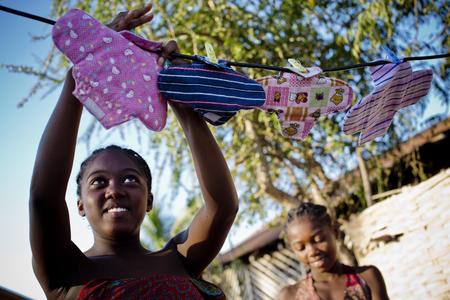Why celebrities and activists are wearing period bracelets this Menstrual Hygiene Day

May 28 marks Menstrual Hygiene Day, also known as Period Day. It's an opportunity to break the taboos surrounding periods which are often so harmful to people who menstruate.
Period bracelets have been worn on this date over the years to raise awareness of issues around menstruation. This year, WaterAid reveals that 2 in 5 people (40%) are still embarrassed to talk about periods, and 3 in 5 people who menstruate (59%) have worried whether their periods are normal.
The bracelets are a simple educational tool, with the five red beads representing the days of bleeding and the other beads denoting the rest of the cycle. They have now become a symbol that periods are nothing to hide.
This is why we asked celebrities, artists and activists to share their pictures wearing the bracelets and why it's still so important to break the silence on periods.
Amanda Mealing
Holby City and Casualty actor Amanda Mealing saw first-hand how important menstrual hygiene is when she visited communities with WaterAid in Ghana:
“As long as we shroud periods in silence, the specific needs will be overlooked. In Ghana, I met girls who miss school for a few days every month because there are no toilets. No one should be held back from reaching their potential because of something as natural as a period.
"On visiting a school where WaterAid has worked, I saw the difference clean water, toilets and hygiene education can make, and was really inspired by students who are leading the way in challenging period stigma by educating their peers and families about menstruation, helping fill them with confidence. I felt many of us could learn a lot from them.”
Nadia Sawalha
Actor and Loose Women presenter Nadia Sawalha said:
“Our bodies are the most remarkable bit of kit! This brilliant body of mine has enabled to birth my daughters onto the kitchen floor, dance on tables, and trek the Himalayas!
"Women are incredible so why oh why do all our natural processes, from periods to menopause and everything in-between, cause such embarrassment?
"Talking about periods should be as normal as having them to ensure the rights and needs of those who menstruate are heard and taken seriously. If we don’t menstruate there is no human race guys!”
Yomi Adegoke
Journalist and author of Slay In Your Lane, Yomi Adegoke said:
“I think it’s hugely important to encourage more open discussion about periods.
"Only by campaigning on the issue have we seen progress in addressing period poverty, such as period products being made available for free in schools and hospitals here in the UK.
"However, a lot more needs to be done to ensure everyone everywhere can manage their periods with dignity.”
Freddy McConnell
Known as the Man who gave birth, Freddy McConnell said:
“Starting your period impacts everyone differently. It’s really important that all young people are empowered to understand and talk about what’s happening, including those who don't have periods themselves.
"Trans boys are especially likely to find this experience tough and need specific support, free from assumption and judgement. Menstruation can feel like a crisis for trans and nonbinary youth but older trans people are here to say that it doesn't have to be that way: we can talk about periods in ways that affirm and include everyone.”
Bec Hill
Known for her paper-puppet visual comedy, stand up performer Bec Hill designed her own period bracelet and said:
“I've always been jealous of those who get their periods like clockwork and I designed my own period bracelet to show that sometimes periods aren’t textbook. I’m supporting WaterAid’s campaign to get people talking about periods as it’s so important for us to know our normal and to ask for advice if we are unsure.”
Bec decided to post instructions on how to make your own bracelet out of wool on her Instagram channel, asking her followers to share pictures of their own creations and tag her!
With the help of our high-profile supporters, we hope that this activity encourages open conversations around the needs of women, girls and all who menstruate around the world.
Shame surrounding periods means people often do not get accurate information about menstrual health and can lead to multiple problems from health, to education to being able to earn an income.
A lack of decent toilets in schools means girls often miss out on their education during their period.
Our research showed that around half or more people who menstruate wouldn’t see their doctor if they experienced the following problems: bleeding between periods, very long-lasting periods, very heavy periods or extreme period pain, despite all these potentially signalling more serious problems. And since lockdown began in March 2020, 57% experienced changes to their menstrual cycle including changes to the duration, frequency and heaviness of their period.*
Women seem prepared to put up with bad periods rather than seek help, while the cost of period products remains a widespread problem - an issue referred to as period poverty.
WaterAid is calling for this moment to mark a turning point where the world finally fully recognises the importance of everyone having clean water, decent sanitation and good hygiene as essential for health and gender equality.
The figures stated in this article are based on a survey carried out of 2,000 adults in May 2021 by One Poll, commissioned by WaterAid.










